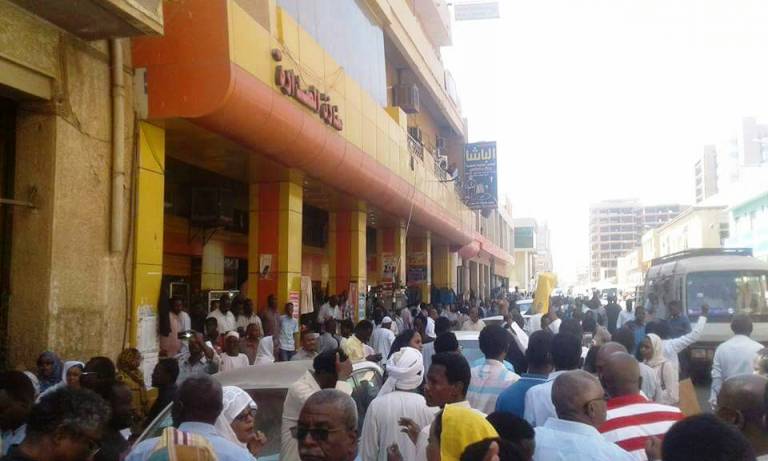Rights groups call to release opponents arrested over Sudan bread protests

January 29, 2018 (KHARTOUM) – Four local and international human rights groups condemned the arbitrary arrest of Sudanese opposition leaders and activists following recent protests against the rising prices and called on the government to try or to release them.
The opposition groups denounced the increase of bread prices earlier and called to organised two protests denouncing the government economic austerity measures on 16 and 17 January.
Following what, the National Intelligence and Security Services (NISS) detained hundreds of protesters including journalists who covered the demonstrations. Over 79 people have been detained since server crackdown on protests.
In a joint statement issued on Monday 29 January four Sudanese and international organizations, Human Rights Watch, Amnesty International, the Al Khatim Adlan Centre for Enlightenment and Human Development, and the African Centre for Justice and Peace Studies, called on the Sudanese authorities either charge them or release them immediately.
“Anyone held incommunicado should be granted immediate access to their lawyers and family members, and all detainees should be released in the absence of valid legal charges consistent with international standards. Authorities also have an obligation to guarantee the physical and psychological well-being of all detainees,” the groups said.
The rights groups further denounced the use of excessive power to disperse the peaceful protesters. The security services savagely beat them with sticks and batons, and made excessive use of tear gas.
“The Government of Sudan must uphold the right to freedom of expression, association, and assembly and initiate an impartial and independent investigation into the excessive use of force against peaceful demonstrators,” said Sarah Jackson, Amnesty International’s Deputy Regional Director for East Africa, the Horn and the Great Lakes.
In a bid to foil the demonstrations, the NISS agents arrested several opposition leaders from their houses before to take to the street, including the leader of the Sudanese Congress Party (SCoP) who was arrested immediately after the increase of bread prices with other leading members of his party. Also, others were arrested from their houses after the protests of first or the second day such Mohamed Mukhtar al-Khatib, political secretary of the Sudanese Communist Party, Mohamed Aldoma, a National Umma Party deputy chairperson and Sarah Nugdalla the secretary general of the National Umma Party.
The four rights groups said the detainees are at risk of bad treatment and torture.
“There have been credible reports that several detainees were beaten in detention, subjected to harsh conditions and verbally abused,” said the statement.
JOURNALISTS DETAINED AND TORTURED
During 16 and 17 January protests, the NISS agents sought to prevent reporting about the protests and targeted the reporters and journalists who were there to cover the demonstrations. The 16 journalists were arrested including reporters working with international media as the AFP, BBC and Reuters.
In parallel, between 15 and 18 January, the authorities confiscated three newspapers multiple times.
“Reporting on the demonstrations has been deemed a ’red-line’ issue by the Sudanese government,” said Albaqir Alafif Mukhtar, Executive Director of the Al Khatim Adlan Centre.
The statement echoed reports in Khartoum about ill-treatment amounting to torture of a detained female journalist and activist, Amel Habani, after a visit by her family. She is among few journalists who are still in jail. The authorities also refused to allow her husband to visit her.
Opposition groups denounced the hypocrisy of the Sudanese authorities for authorising the peaceful demonstration of 16 January which aimed at handing over latter to the Khartoum state governor.
The governor later said he authorised the organisers to come and lodge their letter on the bread price but not to take to the street as they had clearly requested.
The crackdown on the peaceful demonstrators and journalists are seen as an indicator of the lack of freedom of expression, association, and assembly in the country despite the government’s commitment to ensuring freedoms after a national dialogue conference held in October 2016.
“Sudan should immediately put an end to persistent human rights violations by its police and security services, reform laws that give them broad powers of arrests and detention, and repeal immunity that protects officials from prosecution,” said Jehanne Henry, senior Africa researcher at Human Rights Watch.
Henry further called on the Sudanese authorities to “guarantee all detainees access to medical assistance required to ensure their physical and psychological well-being”.
(ST)
